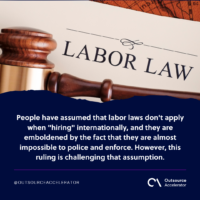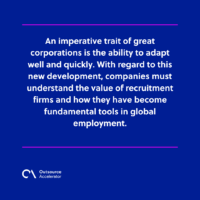Australian ruling protects offshore contractors
After being terminated by an Australian business due to underperformance, a contractual Filipino legal assistant based in the Philippines filed an unfair dismissal claim. Surprisingly, Australia’s Fair Work Commission not only agreed to hear the case but also classified the worker as an employee rather than an independent contractor. Most significantly, the Commission treated the offshore Filipino worker as if they were an Australian citizen working in Australia—meaning that Australian employment laws, benefits, and minimum salaries applied.
This is a profound development that could change how firms outsource offshore. People have assumed that labor laws don’t apply when “hiring” internationally, and they are emboldened by the fact that they are almost impossible to police and enforce. However, this ruling is challenging that assumption.
Offshore contractor boom
Rapid advancements in technology spurred the demand for independent contractors, which COVID-19 later propelled. Post-pandemic, firms still have direct access to a vast network of global talent pools.
Businesses continue to use offshore workers to improve workflows and boost revenues. Independent contractors offer specialized and vital skills ideal for short-term projects or to fill critical labor gaps.
Businesses enjoy reduced onboarding costs as these contractors are ready to work right away. Amid fluctuating workloads and tight deadlines, independent contractors empower firms to be swift and on the go.
Easy employment hack
Typically, an employer-employee relationship is heavily regulated by the country of employment—to avoid unfair pay practices and dismissal and to ensure proper payment of taxes, benefits, and salaries. This was easy to police and enforce when both employer and employee were based in the same country.
However, the advent of remote online work meant that otherwise expensive and cumbersome employment obligations, estimated at 20%-40% of the salary amount, could be sidestepped. In the new online remote world, neither the employer nor the employee (erm, contractor) was bound by or protected by either country’s employment laws. Welcome to the Wild West of employment.
In some respects, it was liberating, but it meant that there was no formal employment agreement and no recourse if anything went wrong. Which, of course, it did. At the same time, the vast number of official staffing companies who were playing by the rules were at a disadvantage to those who sidestepped them.
The problem has continued to grow in line with the explosion of online, remote, and freelance workers. The legal employment system could not attend to this growing issue because the employer-employee relationship covered two different countries and largely existed under the cover of online communication.
Seamless partnership
However, as global employment becomes mainstream, firms will eventually need to agree to comply with the labor laws of the contractor’s home country. When a fad has been tried, tested, and proven to be effective, legislation will catch up soon.
The Australian ruling is a major development that could spark similar claims in bigger economies like the United States, which could accelerate the legislation process. People wrongly assume that hiring someone on a “contract” basis eliminates the requirement to abide by the employment laws of the land. This is not the case. Those unprepared for this rapid shift could lose access to global talent pools.
An imperative trait of great corporations is the ability to adapt well and quickly. With regard to this new development, companies must understand the value of recruitment firms and how they have become fundamental tools in global employment. They not only provide businesses with expert outsourced staff but are also knowledgeable about the nuances of employment regulations worldwide.
Innocent mistakes are the same as grievous and costly errors. Failure to understand and comply with labor laws could result in hefty fines and lawsuits and drain the firm’s finances. Outsourcing companies employ their staff in accordance with local labor laws. They tailor agreements to these rules and regulations so that the employer and the contractor can enjoy a seamless collaboration.
It’s a win-win for both parties. The employer and the freelance worker can simply focus on accomplishing their ends of the bargain without having to worry about the legality of their pact. An outsourcing firm protects them from these issues by ensuring the partnership is healthy, and the business runs smoothly.
The question for your business
Are you hiring offshore contractors? Well, it’s not actually legit…





 Independent
Independent





















